


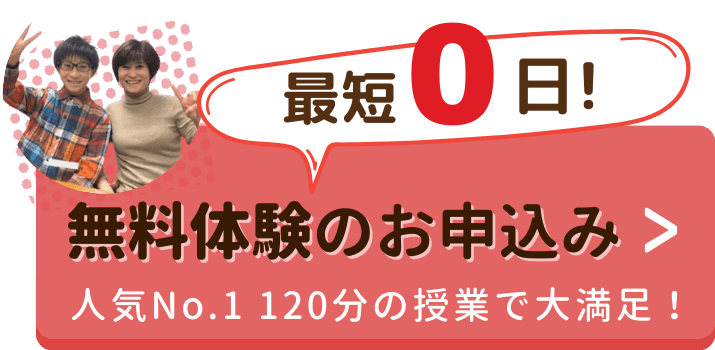
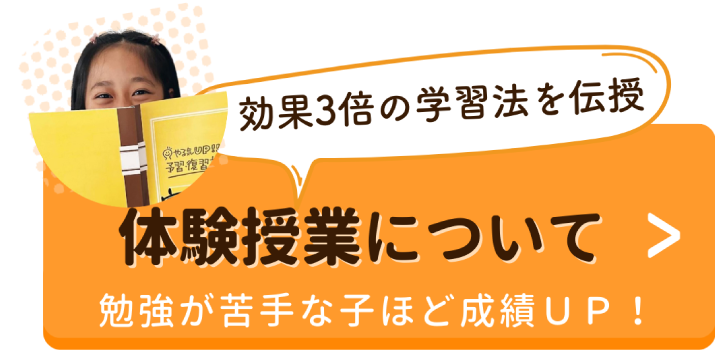
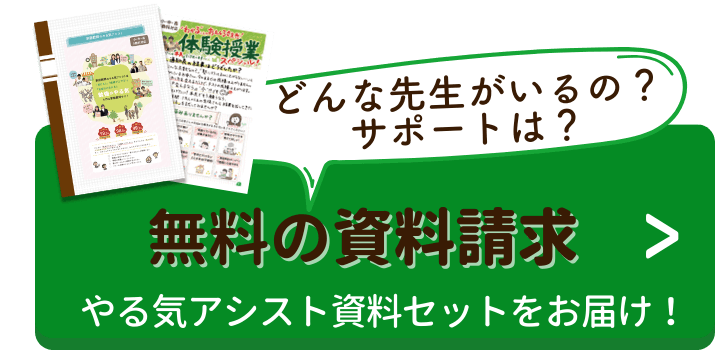

茨城県の2023年3月実施の令和5年度(2023年度)入学者の公立高校入試問題の解説をしています。
受験勉強において、過去問を解くことはとても効果的な勉強法です。ぜひ、受験までに一度挑戦し、問題の傾向を掴んでおきましょう。合わせて、
対策などをたてられるととても良いですね。
また、過去問で苦手な点が見つかった場合は、そこを中心に試験日当日までにしっかりと対策しておきましょう。
(1) これから、No.1からNo.5まで、5つの英文を放送します。放送される英文を聞いて、その内容に合うものを選ぶ問題です。それぞれの英文の内容に最もよく合うものを、ア、イ、ウ、エの中から1つ選んで、その記号を書きなさい。
放送内容 ーーーーーーーーーーーーーーーーーーーーーーーーーーーーーーーーーーーーーーーーーーーーーーー
No.1 My sister is brushing her teeth.
No.2 When you are sick, you should go to this place.
No.3 We are flying over Ibaraki now. We will arrive at the airport in 15 minutes.
No.4 Aoi Museum is more popular than Wakaba Park, but the museum is not as popular as Hibari Castle.
No.5 If you want to go to the shop, go down the street and turn left at the third corner. You’ll find it on your right.
ーーーーーーーーーーーーーーーーーーーーーーーーーーーーーーーーーーーーーーーーーーーーーーー
No.1
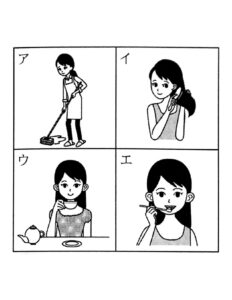
No.2
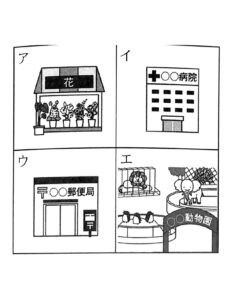
No.3
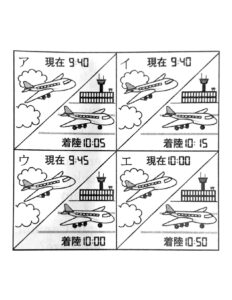
No.4
ア.
遠足に行きたい場所
| 1位 | わかば公園 |
| 2位 | ひばり城 |
| 3位 | あおい博物館 |
イ.
遠足に行きたい場所
| 1位 | あおい博物館 |
| 2位 | わかば公園 |
| 3位 | ひばり城 |
ウ.
遠足に行きたい場所
| 1位 | あおい博物館 |
| 2位 | ひばり城 |
| 3位 | わかば公園 |
エ.
遠足に行きたい場所
| 1位 | ひばり城 |
| 2位 | わかば公園 |
| 3位 | あおい博物館 |
No.5
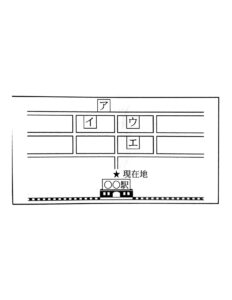
(2) これから、No.1からNo.4まで、4つの対話を放送します。それぞれの対話のあとで、その対話について1つずつ質問します。
それぞれの質問に対して、最も適切な答えを、ア、イ、ウ、エの中から1つ選んで、その記号を書きなさい。
放送内容 ーーーーーーーーーーーーーーーーーーーーーーーーーーーーーーーーーーーーーーーーーーーーーーー
No.1
A : Bob, I have to go to school early tomorrow for the school festival.
B: Me, too. I have to arrive at school by seven thirty.
A : How long does it take to get to school?
B : It takes one hour.
Question: What time will Bob leave for school tomorrow?
No.2
A : Yuka, what will you do tomorrow afternoon?B: I’ll go to the library. I have finished reading my book, so I want to read another.
B : I’ll go to the library. I have finished reading my book, so I want to read another.
A : OK. John and I will go to the movies tomorrow afternoon. Do you want to join us?
B : Oh, yes. Sounds great. I’ll go to the library this afternoon instead.
Question: What will Yuka do tomorrow afternoon?
No.3
A : Oh, no! I forgot about the homework.
B: We need to give it to our teacher by Thursday.
A : We only have today, tomorrow, and Thursday. What do we have to do?
B: We have to write a report about the book we read during winter vacation.
Question: What day of the week is it “today”?
No.4
A : Hi, Yuri. You look so happy.
B : That’s right, Fred. I got an e-mail from my sister. She is studying in Canada.
A : How long has she been there?
B : For two years. She is going to come back this summer, and we’ll have a birthday party for her.
Question: Why does Yuri look happy?
ーーーーーーーーーーーーーーーーーーーーーーーーーーーーーーーーーーーーーーーーーーーーーーー
No. 1
ア. At 6:30.
イ. At 7:00.
ウ. At 7:30.
エ At 8:00.
No.2
ア. She will go to the library.
イ. She will finish reading her book.
ウ. She will enjoy some music.
エ. She will see a movie.
No.3
ア. Monday.
イ. Tuesday.
ウ.Wednesday.
エ. Thursday.
No.4
ア. Because Yuri’s sister will stay in Japan
イ. Because Yuri can stay in Canada with her sister this summer.
ウ. Because Yuri can spend some time with her sister this summer.
エ. Because Yuri’s sister will receive an e-mail from Yuri.
(3)これから、ケンジ(Kenji)とアン(Ann)の対話を放送します。
そのあとで、その内容について、Question No.1とQuestion No.2の2つの質問をします。
それぞれの質問に対して、最も適切な答えを、ア、イ、ウ、エの中から1つ選んで、その記号を書きなさい。
放送内容 ーーーーーーーーーーーーーーーーーーーーーーーーーーーーーーーーーーーーーーーーーーーーーーー
Kenji : Hi Ann, what happened?
Ann : Hey Kenji, I picked this up. I think it’s that
Kenji: That’s not good. He can’t enter his house
Ann : That’s right. I want to run after him, but….
Kenji: Wow, you have so many books.
Ann: I just went to the library. I need a lot of books for my report.
Kenji : They look so heavy… OK, I’ll go after him!
Ann : Thank you!
Kenji: That boy with the dog, right?
Ann: No. Go after the tall boy walking in front of
Kenji : OK.
Questions :
No.1 What did Ann pick up?
No.2 Why will Kenji go after the tall boy instead of Ann?
ーーーーーーーーーーーーーーーーーーーーーーーーーーーーーーーーーーーーーーーーーーーーーーー
No.1
ア. A book.
イ. Akey.
ウ. A cap
エ. A pen.
No.2
ア. Because Ann is carrying a lot of books.
イ. Because Kenji has to write a report.
ウ. Because Ann knows who he is.
エ. Because Kenji wants to go to the library with Ann.
(4) 外国人の観光客に,添乗員が市内観光について説明しています。
これからその説明を放送します。
その内容について、次の①,②の問いに答えなさい。
放送内容 ーーーーーーーーーーーーーーーーーーーーーーーーーーーーーーーーーーーーーーーーーーーーーーー
Welcome to our city trip. Today we’ll visit some famous places by bus. It’s nine o’clock now. First, we’ll arrive at the City Museum in 20 minutes.
We’ll have one and a half hours to see many famous pictures there. In the afternoon, we’ll go to the City Garden. During this season we can see beautiful flowers. Oh, I forgot to say. Before we visit the garden, we’ll have lunch at Aoi restaurant. Finally, we’ll go to the Music Hall and enjoy some wonderful music. Today’s trip will be over at five in the afternoon.
ーーーーーーーーーーーーーーーーーーーーーーーーーーーーーーーーーーーーーーーーーーーーーーー
① この市内観光で訪れる場所を、訪れる順番に並べかえて、記号で答えなさい。
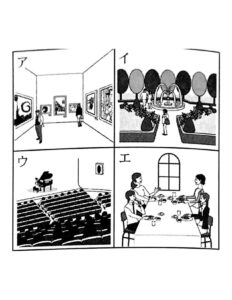
② 次の質問の答えになるように、( )に適切な英語を1語を書きなさい。
How long does this city trip take?
– It takes( )hours.
(1)
No.1 エ
英語 :My sister is brushing her teeth.
日本語:彼女は歯を磨いています
No.2 イ
英語 :When you are sick, you should go to this place.
日本語:病気になったら、この場所に行くと良い
No.3 ウ
英語 :We are flying over Ibaraki now. We will arrive at the airport in 15 minutes.
日本語:私たちは今茨城県の上を飛行しています。15分後に空港に到着します
No.4 エ
英語 :Aoi Museum is more popular than Wakaba Park, but the museum is not as popular
as Hibari Castle.
日本語:あおい博物館はわかば公園より人気だが、美術館はひばり城ほど人気ではない。
No.5 ア
英語 :If you want to go to the shop, go down the street and turn left at the third corner.
You’ll find it on your right.
日本語:もしあなたがその店に行きたければ、この道を進んで3つ目の交差点で左に曲がってください。右側にそれが見えます。
(2)
No.1 ア
【英語】
A: Bob, I have to go to school early tomorrow for the school festival.
B: Me, too. I have to arrive at school by seven thirty.
A: How long does it take to get to school?
B: It takes one hour.
Question: What time will Bob leave for school tomorrow?
【日本語】
A: ボブ、文化祭があるから明日の朝早くに学校に行かないといけないの。
B: 私もだよ。明日の朝7:30に学校に着かないといけないの。
A: 学校に着くまでどれくらいかかるの?
B: 1 時間くらいです。
問題:明日、ボブはいつ出発しなといけないでしょう?
No. 2 エ
【英語】
A: Yuka, what will you do tomorrow afternoon?
B: I’ll go to the library. I have finished reading my book, so I want to read another.
A: OK. John and I will go to the movies tomorrow afternoon. Do you want to join
us?
B: Oh, yes. Sounds great. I’ll go to the library this afternoon instead.
Question: What will Yuka do tomorrow afternoon?
【日本語】
A: ゆか、明日何するつもりなの?
B: 図書館に行くつもり。本を読み切ったから他の本を読みたいの。
A: そうなのですね。ジョンと私は明日の午後に映画を見に行くつもりです。一緒に行きませんか?
B: お、そうなんですね。いいですね。代わりに今日の午後に図書館に行きます。
問題:明日ゆかは何をするつもりですか?
No. 3 イ
【英語】
A: Oh, no! I forgot about the homework.
B: We need to give it to our teacher by Thursday.
A: We only have today, tomorrow, and Thursday. What do we have to do?
B: We have to write a report about the book we read during winter vacation.
Question: What day of the week is it “today”?
【日本語】
A: あ!何が宿題か忘れてしまいました。
B: それを木曜日までに先生に提出しなければいけません。
A: 私たちには今日、明日、木曜日しかありません。なにをしなければいけません
か?
B: 冬休み中に読んだ本についてのレポートを書かないといけません。
問題: 今日は何曜日ですか?
No. 4 ウ
【英語】
A: Hi, Yuri. You look so happy.
B: That’s right, Fred. I got an e-mail from my sister. She is studying in Canada.
A: How long has she been there?
B: For two years. She is going to come back this summer, and we’ll have a birthday
party for her.
Question: Why does Yuri look happy?
【日本語】
A: やあ、ゆり。幸せそうですね。
B: そうなんだよフレッド。お姉ちゃんからメールをもらったの。彼女はカナダで勉強をしているの。
A: 彼女は何年そこにいるの?
B: 2 年です。この夏に戻ってきて、彼女の誕生日パーティーを開くの。
問題:なぜゆりは幸せそうに見えるでしょう?
(3)イ、ア
Kenji: Hi Ann, what happened?
Ann: Hey Kenji, I picked this up. I think it’s that boy’s.
Kenji: That’s not good. He can’t enter his house without it.
Ann: That’s right. I want to run after him, but …,
Kenji: Wow, you have so many books.
Ann: I just went to the library. I need a lot of books for my report.
Kenji: They look so heavy…. OK, I’ll go after him!
Ann: Thank you!
Kenji: That boy with the dog, right?
Ann: No. Go after the tall boy walking in front of him!
Kenji: OK
Questions:
No. 1 What did Ann pick up?
No. 2 Why will Kenji go after the tall boy instead of Ann?
【日本語】
ケンジ: やあ、アン。何があったの?
アン: ねえ、ケンジ。これ拾ったの。あの男の子のものだと思うの。
ケンジ: それはまずいね。彼はそれがないと家に入れないよ。
アン: そうなの。追いかけたいんだけど……。
ケンジ: うわ、本がたくさんあるね。
アン: 図書館に行ってきたの。レポートのためにたくさんの本が必要なの。
ケンジ: 重そうだね……。よし、僕が彼を追いかけるよ!
アン: ありがとう!
ケンジ: 犬を連れているあの男の子だよね?
アン: いいえ、その子の前を歩いている背の高い男の子を追いかけて!
ケンジ: わかった。
問題:
No.1: アンは何を拾いましたか?
No.2: なぜケンジがアンの代わりに背の高い男の子を追いかけるのですか?
(4)ア→エ→イ→ウ、eight
【英語】
Welcome to our city trip. Today we’ll visit some famous places by bus. It’s nine o’clock now. First, we’ll arrive at the City Museum in 20 minutes. We’ll have one and a half hours to see many famous pictures there. In the afternoon, we’ll go to the City Garden. During this season we can see beautiful flowers. Oh, I forgot to say. Before we visit the garden, we’ll have lunch at Aoi restaurant.
Finally, we’ll go to the Music Hall and enjoy some wonderful music. Today’s trip will be over at five in the afternoon.
【日本語】
市内観光へようこそ。本日はバスで有名な場所を巡ります。現在9時です。まず、20分後に市立博物館に到着します。そこでは1時間半かけて多くの有名な絵画を鑑賞します。午後には、市立庭園に向かいます。この季節は美しい花が見られますよ。あ、言い忘れていましたが、庭園を訪れる前に「葵レストラン」で昼食をとります。最後に音楽ホールへ行き、素晴らしい音楽を楽しみます。今日の旅は午後5時に終了します。
モリ先生(Mr.Mori)が留学生のティナ(Tina)、ジム(Jim)と話をしています。次の会話文を読んで、下の(1)、(2)の問いに答えなさい。
Mr. Mori: Tina, your Japanese is very good. How long have you been studying Japanese?
Tina: Thank you. For three years. I talk a lot with my *host family in Japanese but it is difficult to read Japanese, especially kanji. I ①(w ) I could read all the kanji *characters.
Mr. Mori: I see. Kanji will help you understand Japanese better. Jim, you have lived in Japan longer than Tina. You are good at ②(b ) speaking and reading Japanese. How do you usually ③(p ) reading Japanese?
Jim: I read many books ④( write ) in easy Japanese. You can learn a lot of Japanese little by little. Now, I often read *manga. Reading it is
⑤( easy ) than reading other kinds of books.
Mr. Mori: That’s good not only for ⑥( child ) but also for adults. It is very important to enjoy studying.
(1) 会話文が完成するように、文中の①〜③の( )最も適切な英語を、それぞれ1語ずつ書きなさい。
なお、答えはすべて、( )内に示されている文字で書き始めるものとします。
(2)会話文が完成するように、文中の④~⑥の( )の中の語を、それぞれ1語で適切な形に直して 書きなさい。
(1)
①wish
“I wish I could~”で、「できれば~したい」の意。
②both
“both A and B”で、「A も Bもどちらも」の意。
③practice
practice は練習するという意味。この発言後にJimが練習方法を述べている。
(2)
④written
動詞を過去分詞の形にして形容詞化させる。”written in ~”で、「~で書かれた」
⑤easier
漫画は他の本と比べて読みやすいと言っているのでeasyを比較級にする。
⑥children
この場合ある子供一人について述べているわけではないchildを複数形にする。
【本文全訳】
森先生: ティナ、君の日本語はとても上手だね。どのくらい日本語を勉強しているの?
ティナ: ありがとうございます。3年間です。ホストファミリーとたくさん日本語で話しますが、読むのは難しいです。特に漢字が大変で、すべての漢字を読めるようになりたいです。
森先生: そうなんだ。漢字が読めるようになると、日本語の理解が深まるよ。ジム、君はティナより長く日本に住んでいるよね。君は日本語の会話も読解も得意だけど、普段はどうやって読解の練習をしているの?
ジム: 簡単な日本語で書かれた本をたくさん読みます。少しずつ多くの日本語を学べますよ。今はよく漫画を読んでいます。漫画は他の本よりも読みやすいです。
森先生: それは子どもだけでなく、大人にとっても良いことだね。勉強を楽しむことがとても大切だよ。
次の(1)、(2)の問いに答えなさい。
(1) 次の英文は、新聞記事の一部です。
この記事が伝えている内容として最も適切なものを、下のア~エの中から1つ選んで、その記号を書きなさい。
In Japan, over 30 percent of people have pets, such as dogs and cats. Spending time with animals can make people feel happy. It also has good *effects on their health. For example, some people feel healthy when they walk with their dog. Some people feel *relaxed when they are with their cat. If you really want to *lead a happy and healthy life, living with pets may be a good choice.
(注)
effect(s) 効果
healthy 健康な
relaxed くつろいだ
lead a~life ~な生活を送る
ア. The only way to lead a happy life is to have a pet.
イ. Almost all the people want to live with pets.
ウ. Some people feel happy when they are with their pet.
エ. Going to a pet shop will be a good way to improve your health.
(2) 次の英文中の[ ]には、下のア~ウの3つの文が入ります。
意味の通る英文になるように、ア~ウの文を並べかえて、記号で答えなさい。
I like English movies. I want to watch them without *subtitles. Let me tell you the steps I will use. [ ] Through these steps,
I hope to improve my ability and enjoy English movies.
(注)
subtitle(s) 映画やテレビの字幕
ア. Then, I will watch it without subtitles and repeat some of the words that they say.
イ. I will watch a movie with Japanese subtitles first because I want to enjoy the story.
ウ. After I know the story in Japanese, I will watch the movie with English subtitles to understand what the actors are saying.
(1) ウ
本文では、主にペットと一緒にいるときの効果について述べている。
ア:the only way(唯一の方法)ではない。
イ:Almost all(ほとんど全員)ではない(over 30 percentなので)。
ウ:本文の内容に合致する。
エ:ペットを飼うことについて述べているだけでpet shopに行くことではない。
【本文全訳】
日本では、30%以上の人々が犬や猫などのペットを飼っています。動物と過ごす時間は、人々に幸せを感じさせてくれます。それは健康にも良い効果をもたらします。たとえば、犬と散歩することで健康だと感じる人もいますし、猫と一緒にいるとくつろいだ気分になる人もいます。もし本当に幸せで健康的な生活を送りたいなら、ペットと暮らすことが良い選択になるかもしれません。
ア 幸せな生活を送る唯一の方法は、ペットを飼うことです。
イ ほとんどすべての人がペットと暮らしたいと思っています。
ウ ペットと一緒にいると幸せを感じる人もいます。
エ ペットショップに行くことは、健康を改善する良い方法です。
(2)イ→ウ→ア
まず、空欄の前で、the step(段階)とあるので、段階に並べればよいことが分かる。イではfirst(最初に)することが述べられている。イでenjoy the story(ストーリーを楽しむ)とあり、ウの冒頭にAfter I know the story in Japanese(日本語でストーリーを知った後)とあるので、イの次にウが来る。そして、その後without subtitles(字幕なし)で見るのである。
【本文全訳】
私は英語の映画が好きです。字幕なしで観られるようになりたいです。これから使うステップをお伝えします。まず、日本語字幕付きで映画を観ます。ストーリーを楽しみたいからです。その後、ストーリーを日本語で理解したら、英語字幕付きで映画を観て、俳優たちが何を言っているのか理解します。それから、字幕なしで映画を観て、彼らが言う言葉のいくつかを繰り返します。これらのステップを通して、英語力を向上させ、英語の映画を楽しめるようになりたいと思います。
アメリカ合衆国に留学中の高校生のジュン(Jun)と友人のサム(Sam)が、レストランでメニューを見ながら話をしています。
次の対話文を読んで、(1),(2)の問いに答えなさい。
Sam: Look at this *menu. What will you have, Jun?
Jun : Well, everything looks so delicious that I cannot choose. Have you decided yet, Sam?
Sam: Yes. I always choose ( • ) when I come to this restaurant. It is very popular. Today we can eat the steak.
Sam: I have been here several times with my friends
Jun : So you know a lot about this restaurant.
Sam: Right. Are you still thinking about( ② ) to eat?
Jun : Yeah. *Honestly, I don’t like steak very much. So if they have a dish with vegetables, that may be good for me.
Sam: Then, how about curry and rice? You can Jun : Really? That sounds great! I’ll have that.
Sam: Do you want something to drink?
Jun : I want the orange juice.
Sam : Sorry, Jun. Orange juice is not on the list for the “*Drink Set.” You need to pay two *dollars for it, so it will be ( ® ) *in
Jun : I see. That will be no problem. How about Sam: I’ll have coffee. Also I would like to have chocolate cake to dessert. So I have to You Jun: Wait, Your birthday is (, right? You can get a two-dollar *discount today. So, you’ll only need to pay twelve dollars.
Sam: All right. Thank you so much for letting me Jun: You’re welcome. When we have time next”Special Sandwich? I would like to try the
(注)
menu メニュー
Honestly 正直なところ
Drink Set ドリンクセット
dollar(e)ドル
(アメリカの通貨単位、Sで表す)
in total 合計で
dessert デザート
discount 値引き
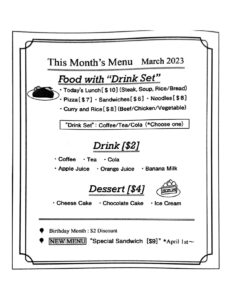
(1)対話文中の(①)~(⑤)に入る最も適切なものを、ア~エの中から1つ選んで、その記号を書きなさい
①
ア. Today’s Lunch
イ. sandwiches
ウ. pizza
エ. noodles
②
ア. how
イ. when
ウ. where
エ. what
③
ア. 8 dollars
イ. 9 dollars
ウ. 10 dollars
エ. 11 dollars
④
ア. February 10th
イ. March 10th
ウ. April 10th
エ. May 10th
⑤
ア. how about making sandwiches together
イ. is this restaurant still open
ウ. do you want me to bring more money
エ. can we come here again
(2)対話の流れに合うように、文中[ ]の( )に適切な英語を1語ずつ入れ、英文を完成させなさい。(3点)
(1)
①ア
Today we can eat steak(今日はステーキが食べられる)とあるので、いつもは違うが今日はステーキが食べられるということであり、Today’s lunch(日替わりランチ)であることが分かる。
②エ
直後でJunが何を食べるかを決めかねているので、何を食べるかを決めたかと問う場面であると分かるため、whatを用いる。
③ウ
$8 のcurry and rice を注文することを提案し、そこに$2のorange juiceを付ける場合の話をしているので、合計は$10。
④イ
メニューの下の方にBirthday Month : $2 Discount(誕生月は2ドル割引)と書いてあり、You can get a two-dollar discount(2 ドルの割引を受けられる)と述べているので、この月(March 2023)はSamの誕生月であることが分かる。
⑤エ
直後に、今回頼むメニューとは別の“Special Sandwich”を食べてみたいと言っているので、もう一回この店に来たいと思っていることが分かる。
(2)How many times
直後にSamがI have been here several times(ここに何度か来たことがある)と答えているため、何度この店に来たことがあるかを問う場面であるということが分かる。
【本文全訳】
サム: このメニューを見て。ジュン、何を食べる?
ジュン: うーん、どれも美味しそうで選べないよ。サムはもう決めたの?
サム: うん。このレストランに来ると、いつも「今日のランチ」を選ぶんだ。すごく人気があるんだよ。今日はステーキが食べられるよ。
ジュン: 今までに何回ここに来たことがあるの?
サム: 友達と何度か来たことがあるよ。
ジュン: じゃあ、このレストランについて詳しいんだね。
サム: そうだね。まだ何を食べるか考えているの?
ジュン: うん。正直言うと、ステーキはあまり好きじゃないんだ。だから、もし野菜を使った料理があれば、それがいいかな。
サム: じゃあ、カレーライスはどう?野菜カレーも選べるよ。
ジュン: 本当?それはいいね!それにするよ。
サム: 飲み物は何にする?
ジュン: オレンジジュースが欲しいな。
サム: ごめん、ジュン。「ドリンクセット」にオレンジジュースは含まれてないんだ。それを頼むと2ドル追加になるから、全部で10ドルになるよ。
ジュン: そうなんだ。それなら問題ないよ。サムはどうする?
サム: 僕はコーヒーにするよ。それと、デザートにチョコレートケーキも頼むつもりだ。
だから、支払う金額は……。
ジュン: ちょっと待って。サムの誕生日って3月10日だよね?今日は2ドルの割引が受けられるよ。だから12ドルだけでいいんだ。
サム: そうか!教えてくれてありがとう。
ジュン: どういたしまして。来月時間があるとき、またここに来てもいい?「スペシャルサンドイッチ」を食べてみたいんだ。
サム: もちろん!僕も食べたいな!
次の英文は、ミキ(Miki)が書いたスピーチの原稿です。
この英文を読んで、(1)~(5)の問いに答えなさい。
“Miki, be ready to move to a new house! You can’t take many books.” My mother kept saying this. We were going to leave town and move abroad
in two months. I had too many books on the*bookshelf. I said, “But, Mom, these are my*treasures. I want to keep these books.”
【 ア 】I read them many times when I was a little child and they are full of good memories. Though I was a junior high school student, I still loved those books very much.
My mother said, “I understand how you feel. But Miki, I’m sure that those books will meet some new people in the future, and you will, too.”
【 イ 】I asked my mother, “Will my books meet new people?” I thought, “What does she mean?” I knew it would be hard to take all of those books to the new house. But I wanted to keep all my treasures.
One Saturday, I went to the city library to say goodbye to my favorite place and to an old woman who worked there. I said to her, “This will be the last time here.” She looked surprised. I spent some time in the library and talked with her. When I left he library, the old woman ran after me. She gave an old book.
After I got home, I started to read the book. Soon I found that it was very interesting. I continued reading it for two hours and finally finished it. The book was about a girl who had to move.【 ウ 】She became stronger throughmeeting new people. Her story gave me great*courage. I remembered my mother’s words.
The next day, I went to the library and said “thank you” to the old woman. She smiled and looked happy. She said, “I moved to this town when
I was as old as you. I read that book and it gave me courage. Good luck at your new place.”
I never thought that I would *let go of my favorite books, but I understood my mother’s words. I decided to give them to other people *like the old woman did. I wanted my books to make someone feel excited or *encouraged.
A few days later, I went to a *used-book store with my mother. 【 エ 】 treasures. My books would meet someone. I hoped that they would become *someone else’s treasures.
Before we moved, the bookshelf in my room became a little lighter. And my heart did, too.
(注)
bookshelf 本棚
treasure(s) 宝物
courage 男気
let goof ~ ~を手放す
like ~のように
encouraged 励まされた
used-book store 古本屋
someone else’s 誰か他の人の
(1) 本文の内容に合う文を、次のア~クの中から3つ選んを書きなさい。
ア. Miki and her family moved to a new house in the same town.
イ. Miki’s mother had a lot of books about treasures.
ウ. Miki’s books were her treasures because they gave her good memories.
エ. Miki soon agreed with her mother’s idea about letting go of all of her books.
オ. One Saturday, Miki went to the library to look for some books.
カ. Miki was given a book by the old woman at school.
キ. Miki finished reading the book which the old woman gave her in two hours.
ク. The old woman moved when she was a junior high school student.
(2)次の文は、文中の【 ア 】~【 エ 】のどこに入るのが最も適切か、記号で答えなさい。
I thought she was like me.
(3) 次の①、②の文を、本文の内容と合うようには[ ]の中に、それぞれ下のア〜エのどれを入れるのが最も適切か、記号で答えなさい。
① The old book given by the old woman made [ ]
ア. Miki nervous
イ. Miki eccouraged
ウ. Miki’s mother angry
エ. Miki’s mother surprised
② On Sunday, Miki went [ ]
ア. to the library to say “thank you” to the old
イ. to the used-book store to say goodbye to her town
ウ. to the library to give her treasures to other people
エ. to the used-book store to read a book
(4)下線部の内容を次の [ ]内のように表した時( )に入るように適切な英語を、本文から4語で抜き出して書きなさい。
And my heart( ), too
(5)次の質問の答えとなるように、( )内のよう表したときに適切な英語を1語ずつ書きなさい。
① When Miki decided to let go of some of her books, what did she understand?
She understood ( ) ( ) ( ) words meant.
② When Miki sold some of her books, what did she hope?
She hoped that ( ) ( ) ( ) someone else’s treasures.
(1)ウ、キ、ク
ア:leave town and move abroad(街を去り、外国に行く)と言っているので✕
イ:本文でそのような内容は述べられていない
ウ:Mikiは” these are my treasures”(これらは私の宝物)や“they are full of good memories.”(私の思い出でいっぱい)と述べているので〇
エ:Mikiは” I want to keep these books”(この本を持っておきたい)などと述べ、すぐには納得していないことが分かる。
オ:“to say goodbye to my favorite place and to an old woman”(私の好きな場所とお
ばあさんにさよならを言いに行く)と言っているが、”look for some books”(本を探す)とは言っていないので✕
カ:Mikiは学校ではなく図書館で本を受け取っているので✕
キ:”I continued reading it for two hours”(本を 2 時間読み続けた)とあるので〇
ク:おばあさんは” I moved to this town when I was as old as you.”と言っているので〇
(2)ウ
ウの直前で“a girl who had to move.”(引っ越ししなければいけない女の子)とあり、
Miki と同じ境遇であるから本を渡したことが分かる。
(3)
①イ
”Her story gave me great *courage”(彼女の物語は私にすごく勇気をくれた)とある。
②ア
Sunday は、図書館に行った土曜日の翌日(The next day)であるので、5段落以降のこ
とが書かれていることが分かる。この日にMikiは“I went to the library and said“ thank
you” to the old woman.”(図書館に行っておばあさんにありがとうと言う)をした。
(4)became a little lighter
文末にtooとあるので、直前と同じであることが分かる。直前では“the bookshelf in my
room became a little lighter”(部屋にある本棚が少し軽くなった)とあるので、それと
同じようにbecame a little lighter となったと考えればよい。
(5)her mother’s words.
①「Mikiが彼女の本を手放すと決めたとき、何を理解していたか?」と聞かれている。本文に“I would *let go of my favorite books, but I understood my mother’s words.“とあるので、understand(理解)していたことはmy mother’s words. つまり、彼女の(her)母の言葉である。解答でmyを使うとあなた自身のと言う意味になるので注意して欲しい。
②they would become
「彼女が本を売ったとき、何を願ったか?」と聞かれている。本文で” I hoped that they would become someone else’s treasures.”とある。
【本文全訳】
「ミキ、新しい家に引っ越す準備をして!本をたくさん持っていくことはできないわよ。」母はそう何度も言っていました。私たちは2か月後にこの町を離れて海外に引っ越すことになっていました。私は本棚に本をたくさん持っていました。そこで私は言いました。「でも、ママ、これらは私の宝物だよ。全部大切にしておきたいの。」それらの本は私が小さい頃に何度も読んだもので、良い思い出がたくさん詰まっているからです。私は中学生になっていましたが、その本たちをとても大切にしていました。母は言いました。「あなたの気持ちはわかるわ。でもね、ミキ、これらの本が未来に新し
い人たちに出会えることを、そしてあなた自身も新しい出会いがあると信じているわ。」私は母に尋ねました。「私の本が新しい人たちに出会うの?」私は「それはどういう意味だろう?」と思いました。すべての本を新しい家に持っていくのが難しいことはわかっていましたが、私はどうしても宝物を手放したくありませんでした。
ある土曜日、私は大好きな場所である市立図書館に別れを告げに行きました。そして、そこに働いている年配の女性にもお別れを言いました。「ここに来るのはこれで最後です」と言うと、彼女は驚いた顔をしました。私は図書館で少しの間過ごし、彼女と話しました。帰ろうとしたとき、その女性が私を追いかけてきて、古い本を手渡してくれました。
家に帰ってから、私はその本を読み始めました。すぐにその本がとても面白いことに気づきました。2時間ぶっ通しで読み続け、ついに読み終えました。その本は引っ越しをしなければならない少女についての物語でした。彼女はまるで私のようでした。彼女は新しい人々との出会いを通して強くなっていきました。その物語は私に大きな勇気を与えてくれました。私は母の言葉を思い出しました。
翌日、図書館に行って、その年配の女性に「ありがとう」と言いました。彼女は微笑み、とても嬉しそうでした。そしてこう言いました。「私もあなたくらいの年の時にこの町に引っ越してきたのよ。そのときにこの本を読んで、勇気をもらったの。新しい場所で頑張ってね。」
私はお気に入りの本を手放すとは思いもしませんでしたが、母の言葉の意味がわかりました。私はその女性のように、自分の本を他の人に譲ることにしました。私の本が誰かをワクワクさせたり、励ましたりしてくれることを願いました。
数日後、私は母と一緒に古本屋に行きました。そして、自分の宝物の一部を売りました。私の本が誰かに出会い、その人の宝物になってくれたらいいな、と思いました。
引っ越し前、私の部屋の本棚は少し軽くなりました。そして、私の心も少し軽くなったのでした。
留学生のエマ(Emma)が、クラスメイトのアズサ(Azusa)とタケル(Takeru)に次の2つのウェブサイトを見せながら旅行について相談しています。
会話の流れに合うように、①~④の( )内の英語を並べ替えて、記号で答えなさい。
ただし、それぞれ不要な語(旬)が1つずつあります。
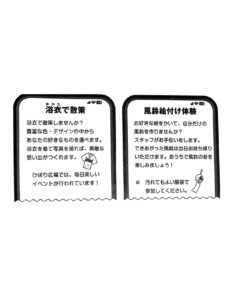
Emma: Summer vacation starts next week! I’m going to *take a day trip with my friends next Wednesday. Which is better to do on the trip, wearing a yukata or *painting on a wind chime
Azusa: If I ①(ア. I would イ. choose ウ. painting on a wind chime エ. wearing a yukata オ. were カ. you). Walking around the city *in traditional clothes sounds great!
Takeru: Painting on a wind chime sounds nice.
Emma: Why do you think so?
Takeru: Because you can take it home with you. You can enjoy the sound of the wind chime at home. The staff members ②(ア. wear イ. you ウ. will エ. paint on オ. show カ. how to ) a wind chime.
Azusa: Well, if you wear a yukata and take some pictures of yourself, you can enjoy them later, too.
Emma: That’s true…. I can’t decide which activity I should choose
Takeru: Well…. ③( ア. you イ. do ウ. a wind chime エ. why t オ. don’t カ . paint on) in the morning? Then you can wear a yukata in the afternoon.
Emma: That’s a good idea. I’ll do that. I don’t ④(ア. my yukata イ. clean ウ.to エ.want オ. dirty カ. make).
(注)
take a day trip 日帰り旅行をする
paint on 〜 〜に絵をかく
wind chime 風鈴
in 〜〜を着て
① オ → カ → ア → イ → エ
“If I were you”は、もし私があなただったらという意味。仮定法を用いている。そのあとには主語であるIをもってきて、動詞→目的語と続ければよい。この発言の直後に”Walking around the city in traditional clothes”(伝統的な服を着て街を歩く)とあるので、最後の目的語はウではなくエ。
② ウ → オ → イ → カ → エ
主語の後に助動詞→動詞→目的語の順に並べればよい。「show+人+物」で、人に物を見せるという意味。wind chimeはwear(着る)ものではなくpaint(塗る)ものなのでアは使わない。
③ エ → オ → ア → カ → ウ
“Why don’t you~”で、「~するのはどうですか?」の意。イは使えない。
④ エ → ウ → カ → ア → オ
“make 物 ~”で、「物を~する」の意。clean(きれい)にしたくないは文脈に合わないので使えない。
【本文全訳】
エマ: 来週から夏休みが始まるわ!来週の水曜日に友達と日帰り旅行に行くの。旅行中に浴衣を着るのと、風鈴の絵付けをするの、どっちがいいと思う?
あずさ: 私なら風鈴の絵付けを選ぶかな。伝統的な服を着て街を歩くのも素敵よね!
たける: 風鈴の絵付けも良さそうだね。
エマ: どうしてそう思うの?
たける: 家に持ち帰れるからさ。家で風鈴の音を楽しめるしね。スタッフが風鈴の絵付けの仕方を教えてくれるよ。
あずさ: でも、浴衣を着て自分の写真を撮ったら、それも後で楽しめるよ。
エマ: それもそうね……。どっちのアクティビティにするか決められないわ。
たける: じゃあ、午前中に風鈴の絵付けをして、午後に浴衣を着たらどう?
エマ: それはいい考えね。そうするわ。浴衣を汚したくないし。
家庭教師のやる気アシストは、茨城県にお住まいの受験生のお子さんを毎年たくさん指導をさせ頂き、合格に導いています。
高い合格率の秘訣は、指導経験豊富な先生の指導力に加え、1対1の指導でお子さん一人ひとりの状況に合わせた、お子さんだけのカリキュラムで勉強が進められるから!
家庭教師のやる気アシストは、お子さんの志望校合格まで全力でサポートさせて頂きます!
お子さんにとって「成果が出る勉強法」ってどんな勉強法だと思いますか?
お子さんそれぞれに、個性や性格、学力の差もあります。そんな十人十色のお子さん全員に合う勉強法ってなかなかないんです。
たからこそ、受験生の今だけでもお子さんだけの勉強法で受験を乗り越えてみませんか?
やる気アシストには、決まったカリキュラムはありません。お子さんの希望や学力、得意や不得意に合わせて、お子さんだけのカリキュラムで指導を行っていきます。また、勉強法もお子さんそれぞれに合う合わないがあります。無料体験授業では、お子さんの性格や生活スタイルを見せていただき、お子さんにとって効率的な成果の出る勉強のやり方をご提案させて頂きます。

